Pizza Hut could double its base in Australia, says chief Phil Reed
Working with the legendary Charlie Bell at McDonald’s taught Phil Reed a lot about the fast food industry. But his latest role at the helm of Pizza Hut Australia is his most challenging yet.
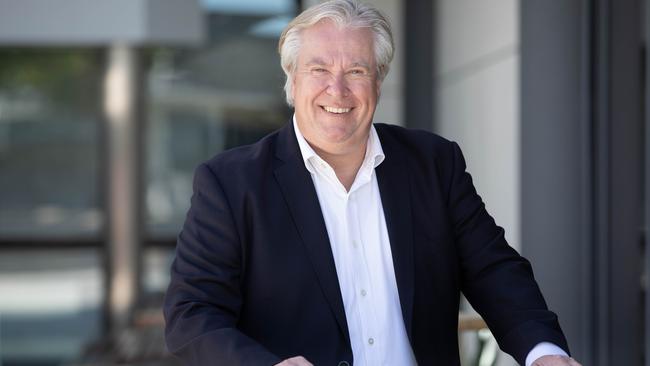
Phil Reed first met Charlie Bell – the legendary Australian who started as a teenager serving fries in Sydney and became the first non-American boss of the McDonald’s global empire – at Budapest’s Ferihegy International Airport in 2002.
Reed, who hails from the seaside village of Lytham Saint Annes in Lancashire in Northern England, was on his first international posting as the marketing director at McDonald’s Hungary.
He remembers greeting Bell and another McDonalds stalwart Don Thompson – who after Bell became the fast-food chain’s first black CEO – as they stepped off their private plane with their entourage.
“They get off the private jet, all of these guys in black suits, which was the way in those days. Charlie looked at me and literally his first words were: ‘Bloody hell, there is a Pom here!’,” Reed recalls with his trademark wide-smile.
“But I have to say, it was an endearing moment. That guy had the ability to just remember everyone’s names without briefing, he understood restaurants and he understood that it is about the customer.”
Reed worked for McDonald’s Europe for the next decade on the development of business and brand planning systems for the chain’s “Plan to Win/I’m Lovin It” turnaround.
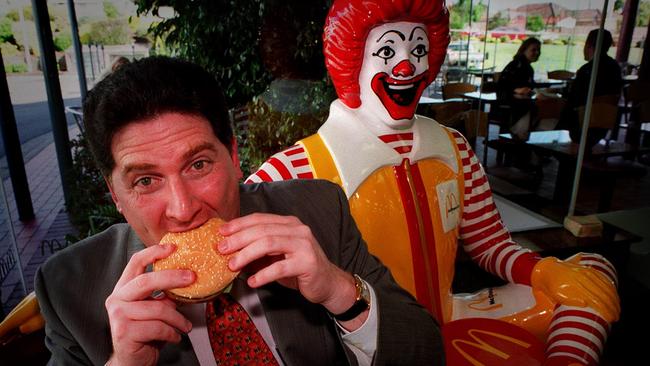
For two years, he worked directly with Bell on the Europe strategy before the Australian tragically passed away in January 2005 after a battle with cancer. He was just 44 years old.
Reed says Bell taught him the value of people in a business and that if you are failing, fail fast.
“It is so easy for us to just look at the profit and loss, the assets, the transactions and the data. But at the end of the day, what makes things happen is people and being able to understand and invest and get people to focus in themselves,” Reed says.
“I think McDonald’s would be very, very different if Charlie had stayed at the helm. McDonald’s surfed the Charlie Bell wave for a decade after he left.”
Now Reed is putting his leanings from Bell and a 35-year career in the quick service restaurant and pizza industry to work in the turnaround of Pizza Hut’s Australian operations, where he has been CEO since 2018.
Pizza Hut opened its first Australian restaurant at Belfield in Sydney’s southwest in 1970 but by 2016 had lost its way, when the local business was acquired by Sydney private equity firm Allegro from the US-based Yum! Brands.
Allegro teamed up with local Pizza Hut management to buy the master franchise agreement for Pizza Hut in Australia.
Turnaround job
Two years later it brought in Reed, whose career highlights included creating Burger King’s “King Deal” global value strategy and the launch of the Burger King brand in Russia where one of his biggest challenges was translating Burger King and the Whopper burger into Cyrillic language.
The affable Reed describes the Australian turnaround as the most challenging of his career.
Within a year of taking over, he slashed 30 per cent of the staff over just three days in late 2019. It looked like something straight out of the standard private equity slash and burn playbook, but Reed argues it was absolutely necessary to get the cost base of the business under control.
He also took heart from the positive response of those who went and those who remained to how he handled the difficult process.
He says his most important focus since has been giving his people belief.
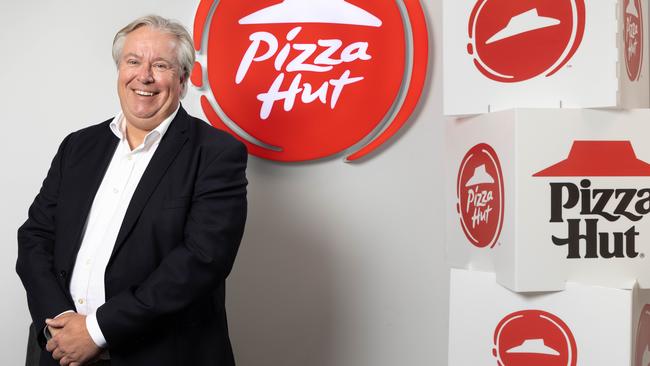
“So often we are looking at data, looking at numbers, looking at all of the KPIs, all of that scientific management approach. But at the end of the day, from a brand perspective, this business is about having fun,’’ he says.
“So for our people, giving them belief is important and when they are given the opportunity to shine, showing them recognition.”
Reed says a key to driving a successful turnaround is having crystal clear clarity on what you need to achieve.
“There is a difference between what you need and want to achieve. Pizza Hut Australia has a 10 year plan. You need to be clear with the team on what the KPIs are and have the ability to measure them so you know the progress you are making,” he says.
He says the biggest threat to a turnaround strategy is over-complicating things, especially in a large corporate organisation.
“Sometimes in business we will approach things from a corporate perspective. We will have set ways of working within departments, set ways of working as a business, certain beliefs in terms of how things should be managed,” he says.
“In reality with turnarounds, you just need to cut it back in terms of understanding the basics. By department, by function, as to what needs to be achieved. Keeping it simple … The other critical thing is supporting people, helping people, enabling people and getting that team dynamic, that team culture.
“In Australia there’s this dichotomy of the team versus a corporate approach.
“In the future, those successful businesses and brands here in Australia will be those that take the right team culture and are able to apply it in a way that breaks the bureaucracy of the corporation.”
For Reed, who was a master franchisee for Burger King in the Netherlands, customer experience has also meant building the capacity of its franchise network again through a people-centric approach.
Pizza Hut has established amateur cricket leagues in Queensland, Victoria and NSW and will do the same in the year ahead in South Australia and Western Australia to give its franchise partners a break from the pizza business during the traditional quite period of trading each February.
But the availability of labour across the franchise network remains a serious, ongoing issue.
Some 225 of Pizza Hut’s franchise partners nationwide are families. Many have only one or two restaurants.
“They are managing the labour situation and we are working with them tactically. For example we are working with career advisers in schools,” Reed says.
“But structurally in Australia there is a challenge on this. We need to give the opportunity for people to come into the country to fill these roles. The other challenge we have today is that where people can get access to Australian visas, generally they’re not working where they need to work, in Sydney and Melbourne … They are being deployed into the regions where there aren’t as many challenges.”
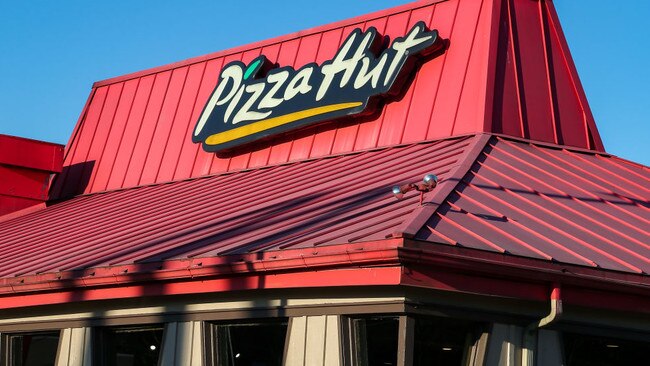
Pizza Hut Australia made just over $245m in sales revenue for the 12 months ending December 31, 2021 up from about $190m a year earlier. It is forecasting to increase last year’s number by around $10m in 2022.
The impact of soaring inflation across its supply chain has so far been contained by striking long term agreements for key commodities and improving relations with suppliers, who Reed says are “respectful” of those contracts.
“We have also demonstrated growth to our suppliers. Four years ago the relationship with them was pretty poor, so we had a summit and shared our plans. We have delivered. Our franchise partners today generate 80 per cent more cash than they did four years ago. So our suppliers are enjoying a significant increase in volumes,” Reed says.
Doubling the business
On a like-for-like basis across its same-store network, compared to four years ago, Pizza Hut stores now do an extra 48,000 transactions and an extra 32,000 deliveries a week. He says the business has enjoyed 39 consecutive months of same store sales growth.
“Right now I’m only servicing 45 per cent of the Australian population. We have 340 trade zones where we could open today,” he says.
“So I could double the business in five years with 500 new stores, easily.
“We have only just started recruiting new franchisees. Already in six weeks, I’ve got 400 expressions of interest where people are looking at investing in the brand and the business,’’ he says.
“I’m in a position, and not off a low base now, where I can deliver high double digit revenue growth for our suppliers. That is growth they are looking for … I think that has also helped us when it comes to those inflationary pressures as well.”
Reed now hopes that in five years, the business will grow fourfold to be turning over $1bn.
His main focus has been reshaping what was a restaurant-based operation into a delivery business by using digital technology.
He has also been experimenting with new formats, including trialling a grab-and-go kiosk concept at service stations.
That trial, which has now ceased, has spawned the rollout of 20 full delivery Pizza Hut stores with Euro Garages Australia, a leading independent British convenience retailer which purchased Woolworth’s service station network in November 2018. Its stations now carry the Ampol brand.
Pizza Hut delivery stores are now open in service stations at Doncaster East in Victoria, Canningvale in WA and one is about to open in Queensland.
“That kiosk trial gave a perspective of the popularity of pizza within the service stations. But I have to say what they’re realising now is that our business is 90 per cent digital and 75 per cent delivery,” Reed says.
The ability of fast food investments to generate strong returns was highlighted last month when troubled investment manager Magellan sold its stake in Mexican restaurant chain Guzman y Gomez for about $140m, a 36.3 per cent premium on its entry price in January 2021.
This potential has underpinned Allegro’s support for investment in the Pizza Hut Australia business, especially in digital technology.
Reed says the owner’s input has been “extremely useful” and while he notes conversations about their potential exit “occasionally happen” – there was speculation last year about a potential sharemarket float – he is only looking 10 to 15 years ahead for the business.
“My desire is hopefully we will have another chat every year, and I’ll let you know how things go,” he says.
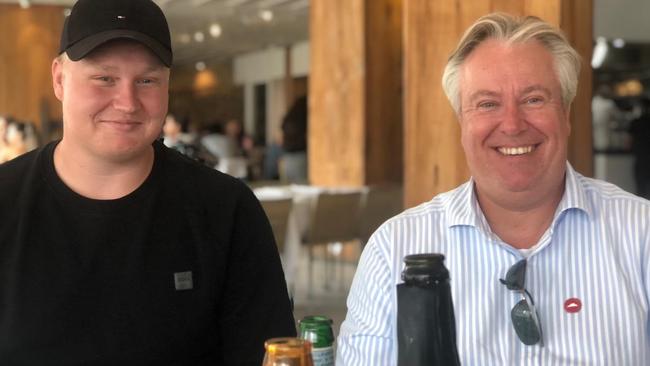
Reed laments the fact that he hasn’t seen his only daughter Hannah, who is based in his UK homeland, since Covid-19 lockdowns started. Over that time she got married and now works with US pay-TV channel Nickelodeon.
Her employment there gave her father an important introduction to Nickelodeon in Australia, which last year struck an agreement with Pizza Hut to licence its cartoon characters such as SpongeBob SquarePants for pizza boxes and sauces.
Reed’s only son Jonnie once had a promising rugby union career in front of him as a tight head prop and captained the England schoolboys team before retiring prematurely because of injuries.
He is now 24 and working in the Pizza Hut head office in Sydney while studying a commerce degree at university.
Reed says he has been a valuable asset in the business after working at fast food stores when his father lived in Budapest, Amsterdam and most recently in the Philippines before 2018.
“We used to have the biggest Burger King in the world at Schiphol Airport (in Amsterdam). You see all of these people working on the front counter, and then there’s this big six foot four, blonde lad. He is just really up for it and really enjoys it but wants to learn. We didn’t plan to bring him into the business here. It’s not something that has been forced,” his father says.
“We just needed someone who got the training in Pizza Hut and he was trained by one of the best in the Philippines. So he could go into the store, he knows what he’s saying, is engaged and loves it. I think to be honest, he would give up the uni studies and be here full time. But neither he, nor my wife and I, will let that happen.”

